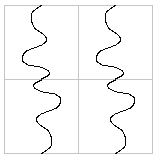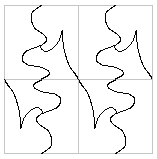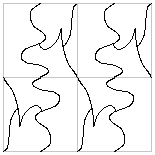p2
This group has no reflections, just a 180o rotation. The
repeating piece is two squares or rectangles:

To create your own:
Just draw whatever you want inside one grey square. Copy that square,
and paste it. Select "Image - Rotate by angle - 180o" from
the menu. Then place it below (or next to) the first square. Select
your two squares (do not include the right or bottom edges), and
"Copy to" another file. Open that file and set it as tiled
wallpaper.
To create a tessellating image:
It is tough to do this, because in order to have a tessellation, the
path must pass through the center of rotation, which is on the
midpoint of the shared side of the square.
1. Start with the grey square (or rectangle). On the very bottom of
the window, you can see the size of your square. Make sure you have
an even number (because of a Paint quirk, the number of pixels per
side will be one less than that number and therefore odd):

2. Select "View - Zoom - Large size" from the menu. Count pixels, and
mark the center pixels of the top and bottom sides (in black).
Draw a path connecting those two points. Then copy your square, paste, rotate 180o,
and place it below the first. It may help to copy your set of two and
paste it next to the first set, to get a better idea of what your tile
will look like.

3. In your original square, draw a path from anywhere on
your first path, into the bottom right corner of the square. Copy just
that square, and paste it over the others, rotating where necessary.

4. You could stop at this point if you wish. You will end up with one
tile repeating over and over with the same orientation, like p1, except
that the tile itself has 180o rotational symmetry. However,
I tend to be a "purist" and prefer tiles with no symmetry of their
own; therefore I will continue in order to end up with a tile having no
symmetry, but appearing in two orientations, one rotated 180o
from the other. Draw a path, in the original square, connecting the
current path to either the upper left or upper right corner. Copy just
that square and paste it over the others, rotating where necessary.

5. Select the two left squares, not including the right or bottom edges,
and "Edit - Copy To" another name. Open that file, remove all the grey
lines and color in. You can use a different color for each tile.
Right-click on this example and
choose "Set as Wallpaper" to see what it looks like:

back





